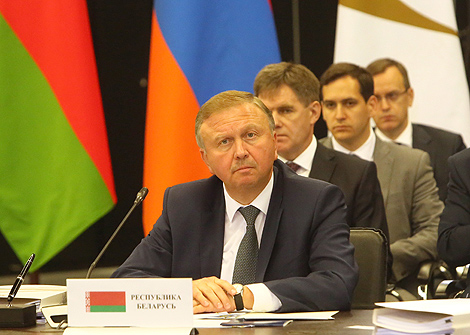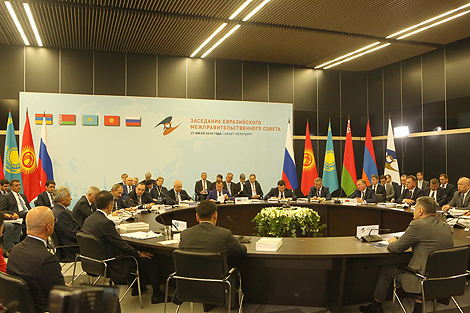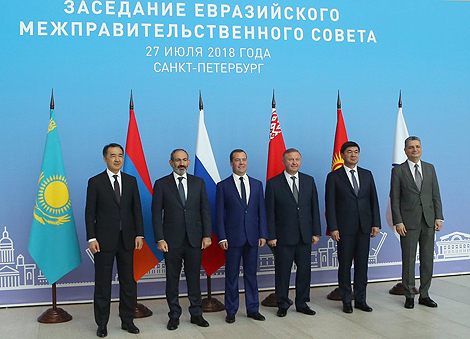Opinions & Interviews
Belarus in favor of equal terms in EAEU common gas market

MINSK, 27 July (BelTA) - Belarus is in favor of equal business conditions for all countries of the Eurasian Economic Union on the common gas market of the union, Belarus’ Prime Minister Andrei Kobyakov said at a meeting of the Eurasian Intergovernmental Council in St. Petersburg on 27 July, BelTA learned from the press service of the government.
“One of the goals of integration is to develop the common gas market of the union. A great job was done to prepare a program to develop the EAEU common gas market. In accordance with the EAEU Treaty we should approve the program this year. This program is expected to become a bedside book for our energy industries for the period until 2024. We are yet to agree on a number of fundamental provisions which we have already discussed at all levels. Belarus would like to see equal conditions for companies from all countries of the Eurasian Economic Union. Our economic operators are waiting for this,” Andrei Kobyakov said.
Belarus applies a similar approach to the preparation of a draft protocol amending the treaty on the Eurasian Economic Union. “Overall this is a good document. But we want clarity on how the rule on national exemptions in public procurement will be applied. In our opinion, such exemptions should be imposed in exceptional cases and for a limited period of time - not more than two years. We believe that the measure, which is regarded as an exceptional and anti-crisis one, cannot be extended for an unlimited number of times,” the Belarusian head of government noted.
 In his words, the establishment of a single commodity transit system using E-seals remains a sensitive issue. “Belarus believes that the new system should be put into practice gradually. It can be modeled on the approaches set out in the agreements on product marking and traceability. It would be right to start with individual commodity groups and move forward progressively as soon as businesses are ready, simultaneously easing administrative procedures,” Andrei Kobyakov believes.
In his words, the establishment of a single commodity transit system using E-seals remains a sensitive issue. “Belarus believes that the new system should be put into practice gradually. It can be modeled on the approaches set out in the agreements on product marking and traceability. It would be right to start with individual commodity groups and move forward progressively as soon as businesses are ready, simultaneously easing administrative procedures,” Andrei Kobyakov believes.
The head of government praised the efforts to set up a high-level working group on cooperation and import substitution in priority areas of the manufacturing industry. “In the past two years our union did a lot to evaluate integration potential in various economic sectors and to identify priority areas of multilateral cooperation from the point of view of import substitution and cooperation opportunities. It is time to translate our goals into reality,” he said.
Andrei Kobyakov noted that the union member states have been demonstrating sustainable economic growth this year. “The EAEU GDP growth in Q1 made up 1.7%. In January-May positive trends were observed in manufacturing, agriculture, retail trade and cargo transportation. The trade between the member states rose by 15%, which was largely attributed to integration processes within the framework of the Eurasian Economic Union. We are creating groundwork to achieve goals of economic integration and to expand this integration. Keys to successful integration include non-discriminated access, removal of existing barriers and restrictions. We have the relevant instructions from the heads of state,” he said.
 Andrei Kobyakov expressed confidence that the outlined matters will be addressed soon. “All the promising areas for further integration will be determined after the analysis of the existing contracts within the EAEU and their effectiveness for our economic entities. If we want to submit a declaration on further integration to our heads of state by the end of the year, we need to work out all the issues before the next meeting of the Eurasian Intergovernmental Council,” the prime minister said.
Andrei Kobyakov expressed confidence that the outlined matters will be addressed soon. “All the promising areas for further integration will be determined after the analysis of the existing contracts within the EAEU and their effectiveness for our economic entities. If we want to submit a declaration on further integration to our heads of state by the end of the year, we need to work out all the issues before the next meeting of the Eurasian Intergovernmental Council,” the prime minister said.
The agenda of the Eurasian Intergovernmental Council included integration issues and ways to improve its legal framework. Other matters included the implementation of the EAEU digital agenda, cooperation in the sector of energy and transport, industrial interaction and customs cooperation. The participants considered the development of the common gas market and the unified goods transit system within the EAEU customs area with the use of technical aids and the alignment of state information systems. The parties also discussed amendments to the Treaty on the EAEU. The EAEU heads of government got familiar with the report of the Eurasian Economic Commission on the distribution of import customs duties between the budgets of the EAEU states in 2017. The next meeting of the Eurasian Intergovernmental Council is due to take place in Belarus.







 print version
print version make home page
make home page add to bookmarks
add to bookmarks

